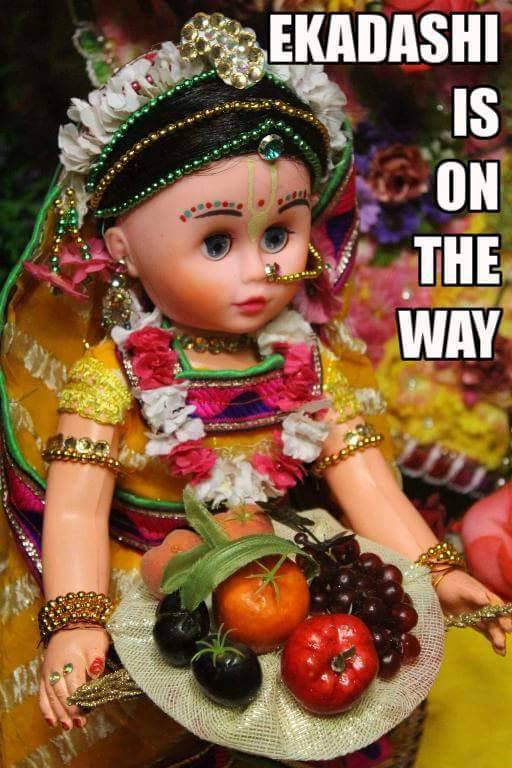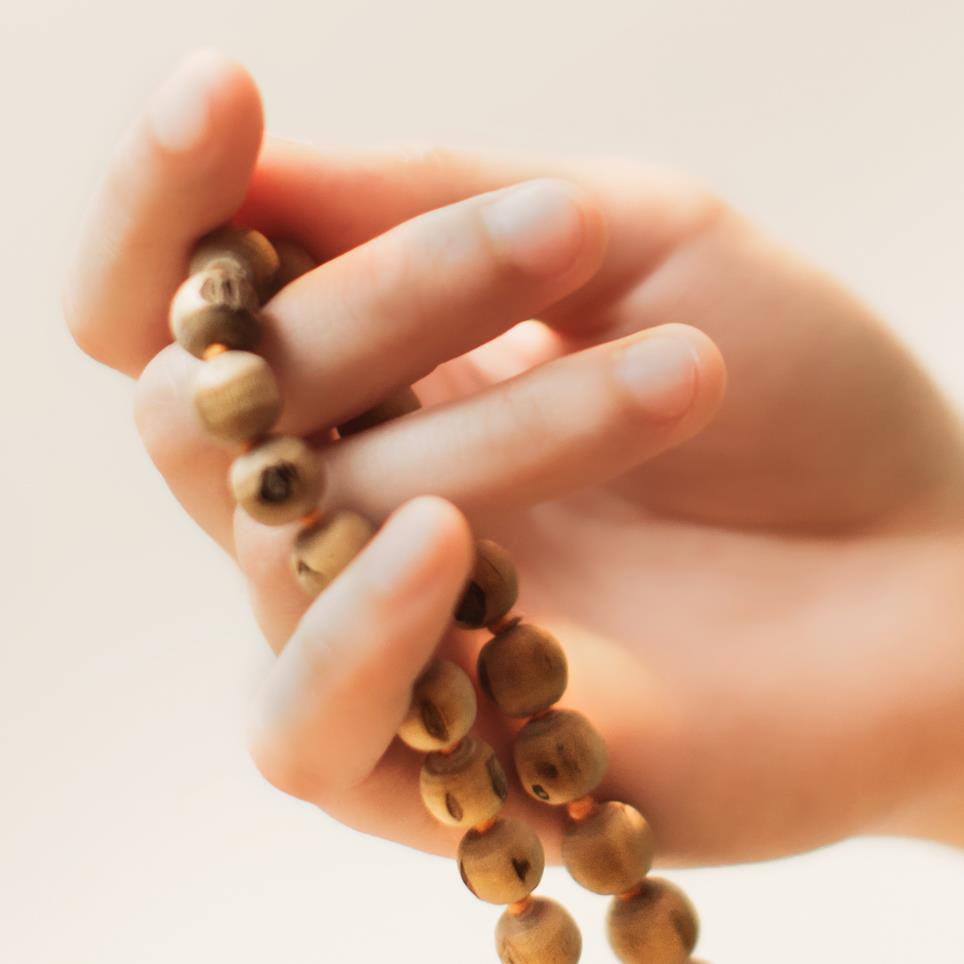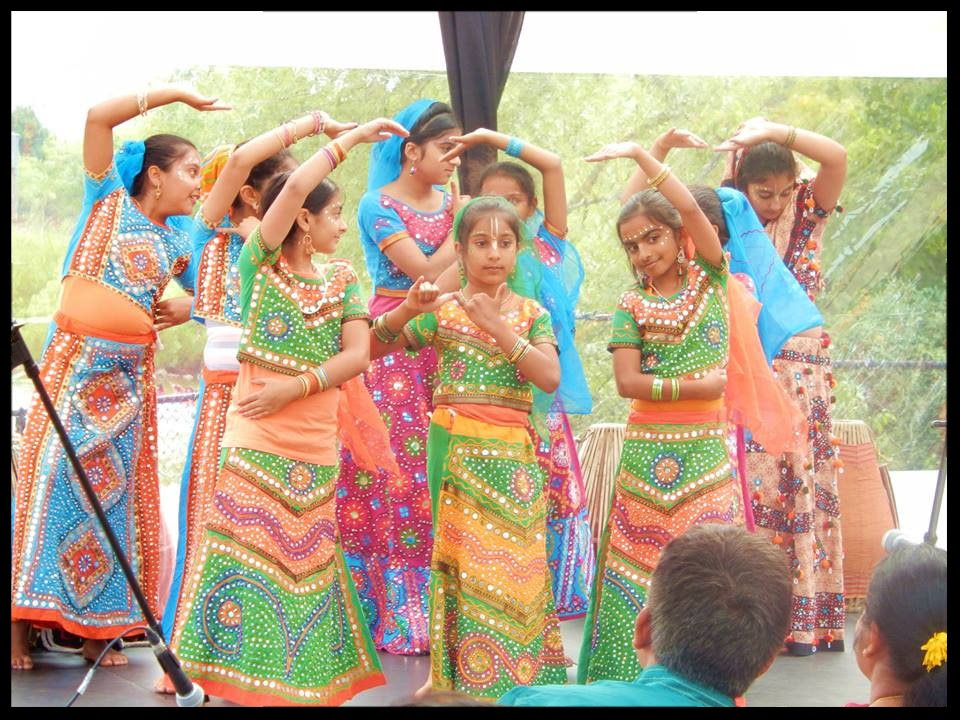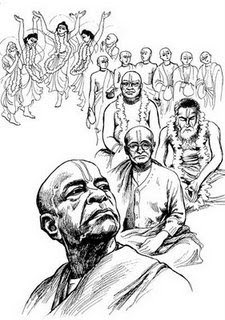Friday, July 21st, 2017
I Shall Not Pass This Way Again / Ведь не пройти той же дорогой дважды
→ Traveling Monk
Том 14, глава 13
23 июля 2017, Польша

Я знаю, что пружина моих биологических часов постепенно раскручивается. Бесполезно это отрицать. Это реальность. Мало того, что мне уже под семьдесят – я перенес две смертельные схватки с раком. Вероятность рецидива остается, и я ценю каждое мгновение на вес золота. Годы, что я провел, тренируясь в сознании Кришны, подготовили меня к приходу старости и болезней и приучили не скорбеть по их поводу. Более того, симптомы старости стали для меня мощным стимулом улучшать качество воспевания – главной деятельности в сознании Кришны – как в личной садхане, так и на людях. Как никогда прежде я осознаю, насколько мне повезло служить миссии моего духовного учителя и, как следствие, замечаю за собой, что, повторяя джапу, сосредотачиваю на каждом слоге маха-мантры все свое внимание. Я также вкладываю свое сердце и душу в воспевание на улицах разных городов по миру.
Десятилетия сменяют друг друга – и с ними приходит ощущение безотлагательности. Количество лет, которое мне осталось прожить, скорее всего, будет числом однозначным, а не двузначным. Так что каждое утро, просыпаясь, я благодарю Шрилу Прабхупаду за возможность представлять – и преданным, которых я обучаю, и людям, которых встречаю – нашу величайшую* преемственность духовных учителей.
Мы отправились рекламировать шестую по счету фестивальную программу (в городе Мендзыздрое на Балтийском побережье Польши), и я с радостью присоединился к поющей группе харинамы. Пока ответственная за монтаж сцены и тентов команда устанавливала их на лужайке главного городского парка, всего в нескольких метрах от переполненного пляжа – семьдесят преданных стали спускаться к песку. Мы прошли мимо троих одетых в черные кожаные куртки потертых мужчин с татуировками, слезавших со своих мотоциклов. Один из них сделал в нашу сторону угрожающий жест и непристойно выругался, двое других прошлись немного за харинамой, издеваясь над нами.
– Не смотрите в их сторону, – сказал я преданным. – Просто продолжайте идти. Ничто и никто не в праве ослабить наш энтузиазм.
Спустившись на пляж, мы стали петь, танцевать и раздавать красочные приглашения. Как всегда, люди были счастливы видеть нас, улыбались и махали в ответ. Было очевидно, что многие из них бывали на наших фестивали раньше.
Одна девчушка, когда мы проходили мимо, подскочила с места и взволнованно спросила свою маму:
– Мамочка, если я заговорю с ними, они меня поймут?
– С ними надо говорить на Харе Кришна, – отвечает мама.
– Это как на французском или немецком? – спрашивает девочка.
– Совершенно верно, – серьезно говорит мама. – Придется тебе учить Харе Кришна.
Наша процессия шла по многолюдному пляжу, и тысячи приглашений разлетались направо и налево. Большинство людей брали их, улыбаясь или обмениваясь с нами рукопожатиями, но одна женщина сердито прикрикнула на своего сына, когда тот взял пригласительный.
– Дай мне сюда! – вскрикнула она. – Это опасные люди.
– Опасные? – переспросил он недоуменно, отводя от нее приглашение подальше. – Они красиво одеты, они поют и танцуют, они улыбаются и приветствуют всех. Что это в них опасного?
– Опасные и все тут! – громко заявила мать. – Все это знают.
– Да все машут им в ответ, – сказал мальчик, – и все улыбаются. Вон кто-то книги у них покупает. Вроде никто не считает их опасными, кроме тебя.
– Ты должен меня слушать! – прикрикнула она. – Выкинь в море.
– Эх, мама.., – протянул мальчик и покачал головой. Она отвернулась. Он улыбнулся мне и сунул приглашение в карман.
Мы шли по пляжу и пели уже около часа. В одном из самых переполненных мест остановились. Я немного рассказал собравшимся вокруг людям о фестивале, а также объяснил, почему мы поем. Они внимательно слушали, хлопали, где надо, и одобрительно кивали. Я подумал: «В древней Индии набожные люди пошли бы в храм или ашрам, чтобы услышать ведическое знание из уст садху или священнослужителя. А я тут в Восточной Европе посреди пляжа делюсь той же самой Абсолютной Истиной с загорающими людьми в купальных костюмах, многие из которых при этом держат банку пива. И они еще аплодируют и соглашаются со многими моими словами! Невероятная милость Шри Чайтаньи Махапрабху».
Я закончил говорить, и несколько преданных пошли в толпу, предлагая книги Шрилы Прабхупады. Я улыбался, глядя на заинтересованных людей, приобретавших наши книги. Киртан и философия тронули их сердца. Отметил одну женщину в окружении по меньшей мере шестерых детей. Она сомневалась, покупать ей книгу или нет и, в конце концов, помотала головой. Мы двинулись дальше.
Полчаса спустя один из ее сыновей догнал нас.
– Мама все-таки решила купить книгу, – выговорил он, запыхавшись. – Вот деньги.
Он взял «Бхагавад-гиту» и, все еще пытаясь отдышаться, продолжил:
– Мама сказала, что вы ушли слишком далеко, и если бы один из нас даже побежал, то не догнал бы вас. Мы так боялись вас упустить, что…
Он показал рукой на пляж. Его братья и сестры выстроились метрах в пятидесяти друг от друга, как эстафетная команда.
– Вот как она хочет эту книгу! – пояснив, он побежал и передал книгу брату, который, в свою очередь, пробежал следующие пятьдесят метров и отдал книгу сестре. Девочка растворилась в толпе, и явно нашла там следующего своего брата или сестру, а первые двое братьев шли обратно по берегу уже не спеша.
Мы пели на протяжении уже нескольких часов. Преданные подпрыгивали и кружились между людьми, пока те купались, загорали и ели мороженое. Одни преданные размахивали цветными флагами и вымпелами, другие раздавали вкусное печенье. Все находившиеся в пределах слышимости киртана восхищенно смотрели на нас. И тут я увидел троих байкеров. Скинув свои кожаные одежды, они расслаблялись на песочке в плавках.
«О-о, – подумал я. – Приближаются проблемы».
Но к моему изумлению, и они стали танцевать с нами, смеясь и пытаясь повторить мантру. Я, было, подумал, что они издеваются, но нет, они явно сами получали от этого удовольствие. Ведущий киртана хотел было уже закончить петь, но я прокричал ему на ухо: «Продолжай! Не останавливайся!» Он посмотрел на меня вопросительно, будто говоря: «Да я совсем выдохся!» Он вел киртан уже более двух часов.
Я покачал головой:
– Продолжай, пока не скажу остановиться.
Святые имена растопили сердца мужчин, которые совсем недавно вели себя так непочтительно. Они всё танцевали – а я улыбался всё шире и шире. Наконец, они повалились от изнеможения на песок, и я показал жестом в равной степени уставшему ведущему киртана, что он может остановиться. Мы пошли дальше, и когда я оглянулся, то один из байкеров улыбнулся и поднял вверх большой палец в знак одобрения. Мне же вспомнился один из моих любимых стихов, написанных Сарвабхаумой Бхаттачарьей:
«C тех пор как Гауранга, сама святая форма любви к Шри Кришне, стал раздавать Свои дары из премы**, все – грешники, аскеты, пьяницы, бандиты, негодяи, воры – вдруг стали столь признательны Ему, что отвергли наслажденье чувств, как будто это яд смертельный, и в опьяненьи громко пели святые имена Шри Кришны, пока без сил не потонули в волнах океана Кришна-премы». [ Сушлока-шатакам, текст 49 ]
Когда мы вернулись на территорию фестиваля, команда монтажников наносила последние штрихи на сцене и в тентах. Группа харинамы с трудом нашла время, чтобы успеть почтить прасадам, пока места у сцены не начали заполняться зрителями. Я видел, как преданные торопились приступить к своему служению.
«Они настоящие бойцы, – думал я. – Ежедневно на харинаме по пять часов, потом еще пять часов служения на фестивале: и на сцене, и в ресторане, и на выставках. И так два месяца без остановки. Освобождение им гарантировано!»
джалпанти хари намани
чайтанйа гьяна рупатах
бхаджанти ваишнаван йе ту
те гаччханти харех падам
«Кто воспевают имена Хари, при этом постигая знанье и следуя порядкам, что передал Чайтанья, а также те, кто поклоняются Вайшнавам – те непременно вступят в обитель Шри Хари». [ «Сушлока-шатакам», текст 80]
Лишь только я присел посмотреть первую часть представления на сцене, как на территорию на велосипеде въехал молодой человек. Попетляв какое-то время среди толпы, он остановился напротив меня.
– Учитель, учитель, – обратился он, – я вернулся! Проехал двести километров, чтобы попасть сюда. Вы же меня помните?
– Помню, – сказал я, улыбнувшись. – Мы встречаемся на этом самом месте в этом городе каждое лето.
– Точно, – ответил он. – Вы же знаете, почему я приезжаю. Один вечер, проведенный с вами, помогает мне весь оставшийся год. Серьезно. Представление, пение, ваши счастливые улыбающиеся лица – этого достаточно для того, чтобы у меня появились силы перенести все испытания жизни. Потому что я знаю – всеблагой Господь со мной.
– Удивительно, – сказал я.
– А вы не забыли, – с хитрецой произнес он, – об очередной вашей особой ежегодной милости ко мне, учитель?
Мне пришлось напрячься.
– Об угощении! – воскликнул он. – Я ведь человек бедный, потому и на велосипеде. Не могу купить даже билет на автобус! Представьте, как я голоден.
Улыбнувшись и взяв его за руку, я отравился с ним в ресторан.
– Этому моему другу я лично разрешаю есть всё, что он хочет и сколько хочет, – сказал я преданной на кассе.
На другой стороне ресторанной палатки я увидел крупного мужчину со шрамами и синяками на лице. И узнал в нем еще одного необычного ветерана наших фестивалей.
Подойдя поближе, тот сказал:
– Я месяцами жду возможности поговорить с вами, на календаре подсчитываю, сколько же осталось до приезда фестиваля в город. Жизнь у меня все такая же трудная, едва свожу концы с концами. Стараюсь следовать вашему совету отнестись более серьезно к духовной жизни, но в последнее время дела идут совсем плохо. Только и думаю, что о своих бедах. Знаете, они ведь конфисковали мой дом.
Он разрыдался.
– Давайте поговорим на свежем воздухе, – предложил я.
– Такая вот жизнь… ни жене, ни детям не в радость, – сказал он, когда мы вышли из ресторана. – Сплошная борьба за существование. В один прекрасный день я сдался. Решил повеситься на дереве у дороги, да проезжавший мимо мотоциклист остановился и перерезал веревку.
– Жаль это слышать, – сказал я. – Помните, что я говорил вам в прошлом году?
– Да, помню, – тихо ответил он. – Вы говорили, что все мы страдаем или наслаждаемся из-за своих прошлых дел. И что мы должны переносить печали и радости так же, как терпим смену времен года.
– Да, – сказал я.
– Еще что в трудные времена надо искать прибежище у Бога. И если жена у меня набожная католичка, я должен ходить с ней в церковь и просить Бога о руководстве.
– И вы это делаете? – спросил я.
– Вообще-то, нет, – ответил он, сконфузившись.
– Но если вы не слушаете моего совета, что я могу поделать? – спросил я. – Это в ваших собственных интересах.
– Да, – сказал он. – Пришло время стать серьезным и делать, что вы говорите. Я обещаю начать ходить в костел. Еще раз, как звучит молитва, которую вы тогда сказали мне повторять?
Я написал Харе Кришна мантру и отдал ему.
– Это имена Бога, – сказал я. – Самая могущественная молитва для нашей эпохи.
– А это ничего, если я буду произносить их в костеле? – спросил он.
– Почему бы нет, – ответил я. – Это воззвание к Господу всех религий.
Когда мы прощались, он протянул мне пачку злотых.
– Я не могу их взять, – сказал я.
– Нет, пожалуйста! – настаивал он. – Я зарабатываю их по выходным в кулачных боях. Отсюда у меня все эти синяки и шрамы. Каждый год откладываю часть денег для вас. Прошу, пожалуйста, возьмите.
Я взял деньги с намерением передать их на распространение книг Шрилы Прабхупады.
Подошло время моей лекции. Я отправился к сцене, и сердце мое было полностью удовлетворено еще одним днем служения Господу.
****************************
«Мне бы хотелось пройти по миру лишь однажды. Поэтому буду делать прямо сейчас все то хорошее, что только могу и выкажу любому встречному всю доброту, что только могу выказать. Да не отложу я ничего и не пренебрегу ничем, ведь не пройти той же дорогой дважды».
[ Стивен Греллет, миссионер-квакер (1773-1855) ]
_______
* в оригинале «our august succession» – «нашу августейшую преемственность» (прим. ред.)
** према (санскр.) – любовь к Кришне (прим. ред.)
Great personalities inspire
→ KKSBlog
(Kadamba Kanana Swami, 18 September 2012, Cape Town, South Africa, Srimad Bhagavatam Lecture)
 Gajendra (the elephant in Srimad Bhagavatam, Chapter 8) realised that this material world in itself has no value. There may be so much enjoyment in the world but what is its value when all the enjoyment is temporary and can never fulfil the soul. It is never enough no matter how good.
Gajendra (the elephant in Srimad Bhagavatam, Chapter 8) realised that this material world in itself has no value. There may be so much enjoyment in the world but what is its value when all the enjoyment is temporary and can never fulfil the soul. It is never enough no matter how good.
Gajendra was thoroughly realised on this matter and therefore Gajendra was interested in the spiritual world, in going back to Godhead. It is for that reason that Gajendra made it into Srimad Bhagavatam because generally the Bhagavatam is not a book that describes the lives of animals but Gajendra became a role model, a personality of which we take shelter and from whose example we take inspiration.
 This is what spiritual life is about – one must take shelter of exemplary personalities; we function like that. Alone, on our own strength, we cannot do so much. Therefore, we must take shelter of others who are doing greater things than we are as this gives us strength and inspiration.
This is what spiritual life is about – one must take shelter of exemplary personalities; we function like that. Alone, on our own strength, we cannot do so much. Therefore, we must take shelter of others who are doing greater things than we are as this gives us strength and inspiration.
This is a very important principle in spiritual life. The Srimad Bhagavatam gives us many examples of great personalities who chose for Krsna – under trying circumstances, they left material security and they just chose for Krsna. This is also our situation because ultimately, this material world is the domain of death and therefore everyone in the material world is in a dangerous position therefore we too must choose for Krsna.
Harinama in Barnaul, Russia (Altai Krai) (5 min video)Srila…
→ Dandavats
 Harinama in Barnaul, Russia (Altai Krai) (5 min video)
Srila Prabhupada: The liberated sage Kardama Muni could see Garuda carrying the Lord on th...
Harinama in Barnaul, Russia (Altai Krai) (5 min video)
Srila Prabhupada: The liberated sage Kardama Muni could see Garuda carrying the Lord on th... Tramlines Festival Street Party (Album with photos)
Street…
→ Dandavats

Tramlines Festival Street Party (Album with photos)
Street party at the Tramlines Festival with The Hare Krishna Festival Team :-)
Sheffield’s Tramlines Festival is one of the UK’s biggest with over 100,000 people attending.
The Hare Krishna Festival Team have teamed up with local devotees to chant and dance through the city’s streets during the event.
We brought 5,000 flyers to hand out, inviting people to Sheffield’s Hare Krishna Festival on 3rd August.
Find them here: https://goo.gl/z2EPfU
Spiritual life: why it requires a practice of repetition?
→ Dandavats

Spiritual life: why it requires a practice of repetition?
Spiritual training involves scrubbing out deeply ingrained habits, which takes time and reiteration. It is like trying to flatten a scroll that has been coiled for thousands of years. One pass of our hands across the surface won’t do it. We have to press it out again and again.
Saturday evening in NVD
→ SivaramaSwami.com
How is siksa guru selected
→ SivaramaSwami.com
Conversation with Siddhartha dasa.
A Monk in Manchester (4 min video)
→ Dandavats
 A Monk in Manchester (4 min video)
Sivarama Maharaja visited Manchester and initiated Artee Passi who became Gaura-Arati devi dasi. Maharaja spok...
A Monk in Manchester (4 min video)
Sivarama Maharaja visited Manchester and initiated Artee Passi who became Gaura-Arati devi dasi. Maharaja spok... Program at Apollo Hospital: “A Spiritual Dimension to…
→ Dandavats

Program at Apollo Hospital: “A Spiritual Dimension to Medical Science”
Anadi Jagannath Das: On July 13th 2017, ISKCON Seshadripuram (Bangalore) conducted a program at the Apollo Hospital in Bannerghatta Road, Bangalore. The event was entitled “A Spiritual Dimension to Medical Science”, and the lecture was delivered by H.G. Devaki Mataji, who is currently undergoing chemotherapy at the same hospital. It was offered as a program of gratitude to all the staff that had nicely taken care of mataji during her treatment. What a better way to thank than sharing the spiritual dimension to medical science! Devaki mataji went to the hospital a few days before the program to individually invite the doctors, nurses and staff. She visited all the departments of the Hospital and distributed 600 invitation cards which had been specially printed for this program. In this way everyone was so charmed and obliged to come and participate in the program.
On Thursday, July 13th, the program was scheduled to start at 3pm in a training hall within the hospital. The hospital management was very supportive and provided us with everything required, and also attended the program. Local devotees also arrived to help with serving prasadam, welcoming guests and distributing books. By 3.05pm many doctors, nurses and medical staff had gathered, and all the 85 seats in the room were occupied. More people were arriving to stand just outside the door, trying to hear with great eagerness.
Devaki mataji began the session with a short and sweet kirtan. She then introduced herself (as a qualified physiotherapist who was trained in Germany, and now giving rehabilitation for the soul as a preacher) and expressed how essential it is for all people in the medical line to understand the science of the soul. This knowledge will immensely help doctors in treating and benefitting patients, especially those with terminal illnesses. She commented on BG.9.2 and boldly stated that a doctor will only be first class, if he adds this king of education to his life. Otherwise he will only be second class. Without a clear understanding of the science of the soul medical science tends to become inhuman. She also briefly explained what happens at the moment of death, and how important it is for medical personnel to help their patients prepare for this final challenge. Everyone listened very attentively, and after her speech many asked questions, to which Mataji presented good answers. Many of the people in the audience were Christian, and also some Muslims attended. Devaki Mataji presented the topics in a broad and expert way to include people from all religious backgrounds.
We concluded the program by all participants honoring prasadam: lemon-mint juice, tasty samosas, vegetable puffs, carob cookies and rich burfi.
Everyone received a brochure entitled “Prabhupada - the Messenger of God” and an invitation for Sri Krishna Janmastami .Some also purchased Srila Prabhupada’s books, kirtan CDs and japa beads. Some of them asked when the next program would take place. We request the prayers and blessings of the devotees to continue this hospital preaching.
The talk is available in https://youtu.be/d7yAQpHtS1o
The Exalted Bhakta-Bhagavata.
This publication, available in…
→ Dandavats

The Exalted Bhakta-Bhagavata.
This publication, available in hard and soft bound, is a condensed version of HH Gaura Govinda Swami’s remarkable life.
To read it online click here: https://issuu.com/tvpbooks/docs/book_ebb/6
The overwhelming and overflowing passion of the Vaishnava heart…
→ Dandavats

The overwhelming and overflowing passion of the Vaishnava heart (video)
Prahlada Maharaja’s mood. A Recent class of Vaisesika Prabhu in Bhaktivedanta Manor.
Watch it here: https://goo.gl/Yax1kF
If we see devotees’ love for us as Krishna’s love coming through them, are we not depersonalizing devotees?
→ The Spiritual Scientist
Answer Podcast
The post If we see devotees’ love for us as Krishna’s love coming through them, are we not depersonalizing devotees? appeared first on The Spiritual Scientist.
If others’ love for us is Krishna’s love coming through them, does that apply to their anger too?
→ The Spiritual Scientist
Answer Podcast
The post If others’ love for us is Krishna’s love coming through them, does that apply to their anger too? appeared first on The Spiritual Scientist.
How can a devotee work in an anti-devotional profession that goes against the four regulative principles?
→ The Spiritual Scientist
Answer Podcast
The post How can a devotee work in an anti-devotional profession that goes against the four regulative principles? appeared first on The Spiritual Scientist.
As sadhakas with anarthas, how much should we rely on astrology?
→ The Spiritual Scientist
Answer Podcast
The post As sadhakas with anarthas, how much should we rely on astrology? appeared first on The Spiritual Scientist.
I was an honest disbeliever instead of being a hypocritical believer, yet I suffered – why?
→ The Spiritual Scientist
Answer Podcast
The post I was an honest disbeliever instead of being a hypocritical believer, yet I suffered – why? appeared first on The Spiritual Scientist.
Is forgiving those who have hurt us necessary for moving on in our life?
→ The Spiritual Scientist
Answer Podcast
The post Is forgiving those who have hurt us necessary for moving on in our life? appeared first on The Spiritual Scientist.
Is the self located in the brain?
→ The Spiritual Scientist
Answer Podcast
The post Is the self located in the brain? appeared first on The Spiritual Scientist.
Paramahamster – Ekadashi
→ ISKCON News
Kirtan Academy on the Road
→ ISKCON News
Know Your Enemy
→ ISKCON News
Timeline of Srila Prabhupada’s Travels
→ ISKCON News
TOVP Launches “FullDome Mayapur” Project
→ ISKCON News

The devotees from the TOVP team are developing a project called FullDome. This project will be located on a small piece of land near Srila Prabhupada’s Samadhi. Operation FullDome is a way to give any visiting guest to Sri Dham Mayapur an opportunity to experience the most unique immersive spiritual experience in a spiritual town.
Project Update: Beautifying Krishna’s Temple in Central London
→ ISKCON News
Thursday, July 20th, 2017
→ The Walking Monk
Intro to the Bhagavatam
→ SivaramaSwami.com
Mid-Year TOVP Update 2017 Video
- TOVP.org
The following is a mid-year video report for 2017 by Sadbhuja das on the progress of the external finishing work at the TOVP.
The post Mid-Year TOVP Update 2017 Video appeared first on Temple of the Vedic Planetarium.
Pada-yatra 2017 – From Canterbury to Folkstone, UK (Album with…
→ Dandavats
 Pada-yatra 2017 - From Canterbury to Folkstone, UK (Album with photos)
Srila Prabhupada: In this age of Kali, intelligent persons perform congreg...
Pada-yatra 2017 - From Canterbury to Folkstone, UK (Album with photos)
Srila Prabhupada: In this age of Kali, intelligent persons perform congreg... Media Coverage of Ratha-Yatra (Festival of India)
→ The Toronto Hare Krishna Temple!
CTV News:
Canadian Immigrant Magazine:
BlogTO:
The annual Festival of India is this weekend in #Toronto https://t.co/ZKJ7IT9XXg pic.twitter.com/o7YUUl1KuK— blogTO (@blogTO) July 14, 2017
Videos: Ratha-Yatra (Festival of India) 2017
→ The Toronto Hare Krishna Temple!
A Monk in Manchester
→ SivaramaSwami.com
Full Videos of the Amazing 12-Hour Kirtan!
→ The Toronto Hare Krishna Temple!
Special program this Sunday – Snan Yatra – Bathing ceremony of Lord Jagganath, Baladev and Subhadra mai.
→ ISKCON Brampton

Chant: Hare Krishna Hare Krishna Krishna Krishna Hare Hare Hare Rama Hare Rama Rama Rama Hare Hare And Be Happy!! | ||||||||||||||||||
| ||||||||||||||||||
| ||||||||||||||||||
ISKCON-London Radha-Krishna Temple Project Update: Beautifying…
→ Dandavats

ISKCON-London Radha-Krishna Temple Project Update: Beautifying Krishna’s Temple - Temple Facade Refurbishment (3 min video)
Watch it here: https://goo.gl/SjT9th
From Devouring to Honoring: Bhakti as Culinary Therapy.
Krishna…
→ Dandavats

From Devouring to Honoring: Bhakti as Culinary Therapy.
Krishna Kshetra Swami’s notes for his lecture at the 9th European Farm Conference in Villa Vrindavan, Italy.
Introduction: Facing the problem of civilizational disease: how to present the bhakti paradigm as effective civilizational therapy. (Essentially: how to make “simple living and high thinking” intellectually attractive and plausible)
“Cowspiracy” – the big environmental protection organizations studiously avoid the issue of meat production.
(Same silence in the EAT Forum (Sweden) “How Food Can Save the World” article.)
One thing is clear – environmentalism is mainstream, and we can take advantage.
Oxford Centre for Animal Ethics, “The Ethics of Eating Animals” conference.
“Reframing” traditional (Indian) thought and practice as therapy
( actually the therapeutic paradigm has an ancient pedigree in India)
presenting Dharma, Yoga, and their culmination in Bhakti
Dharma: “Establishing Moral Community: the Fivefold Sacrifice (pañca-yajña)”
Response to the condition of existential debt … (in five features: deva-ṛṇa, ṛṣī-ṛṇa, pitṛ-ṛṇa, nṛ-ṛṇa, and bhūta-ṛṇa)
… which is easy to perform (easy and straightforward compared to complex contemporary multinational capitalist consumer-based life)
… consisting of five “sacrifices” – five types of giving, which is truly global exchange.
The therapy: (1) quid pro quo exchange consciousness, >> (2) gratitude for goodwill and trust, inspiring goodwill and trustworthiness…
… thus establishing a “moral community of mutual trust and responsibility, mutual obligations, reciprocal acknowledgements of rights and duties and the general demand for inter-personal regard” (K. Stamm)that involves all beings, visible and invisible.
Implied metaphysics: behind all existence is a conscious principle.
Yoga: “Rehabilitation Through Yoga”
Metaphysical basics to understand Yoga’s transformative potential: puruṣa & prakṛti
The human condition as a diseased condition: PYS Ch. 1: vyādhi to samādhi.
aṣṭāṅga-yoga >> yama & niyama >> ahiṁsa … & pratyāhāra (in contrast to atyāhāra.)
… leading to shrinking and ideally erasing all forms of violence
Bhakti: “Curative Devotion”
So far: moral community and rehabituation, based on non-reductionist (all is matter and energy) metaphysics.
But neither of these practices – Dharma or Yoga – are going to be attractive to the vast majority of people.
Hence, the third option, bhakti, by which the trans-temporal self experiences relishable aesthetic relationship with its trans-temporal counterpart, the supreme self or over-soul (paramātmā).
Bhakti springs from the natural inclination of the self to be consequentially reformed to enable transcendent relationship.
patraṁ puṣpaṁ phalaṁ toyaṁ… & yat karoṣi yat aśnāsi…
These acts are deeply therapeutic, by bringing everyone quickly in ever deepening loving exchange in divine participation.
One’s own personhood fully unfolds, leading to realization of the common personhood of all beings…
… such that moral community expands out into devotional community in expanding spheres of compassion and care.
Still, who will do this? Therefore yad yad ācārati śreṣṭhas…
Concluding Reflections
How to connect these eastern thought traditions with the West?
Possible connection with a recent development in western ethical thought – the “ethics of care”.
But “Virtually all [traditional communities] are patriarchal” (Virginia Held).
Bhakti as a metaphysics of gender equality.
Bhakti as metaphysical grounding for ethics of care…
… such that people can let go of the eating habits, compulsions, which are destroying human civilization and the world.
viṣayā vinivartante…paraṁ dṛṣtvā nivartate: the change of attitude from devouring to honoring (of non-animal, sanctified food).
hence: saṁkīrtan yajña !! – as expansion of Dharma’s moral community, realization of Yoga, and fulfillment of Bhakti.
Arjuna and the survivors of the Yadu dynasty
→ Dandavats
 By Ravindra Svarupa Dasa
By Ravindra Svarupa Dasa Srimad-Bhagavatam - Eleventh Canto - Chapter 31: The Disappearance of Lord Śrī Kṛṣṇa. (Spoken by Śukadeva Gosvāmī to King Parīkṣit). Arjuna took the survivors of the Yadu dynasty—the women, children and old men—to Indraprastha, where he installed Vajra as ruler of the Yadus. Hearing from Arjuna of the death of their friend, my dear King, your grandfathers established you as the maintainer of the dynasty and left to prepare for their departure from this world. Continue reading "Arjuna and the survivors of the Yadu dynasty
→ Dandavats"
Can we think about Krsna’s pastimes while chanting?
→ SivaramaSwami.com
Conversation with Gaura Krsna.
The Challenges and Benefits of Charitable Giving
→ Dandavats
 By Krsnanandini Devi Dasi
By Krsnanandini Devi Dasi I have vivid memories of the many times my mother took my siblings and me to church the heartfelt gospel singing, the soul-stirring preaching, the supplications for lost souls to join the church. I remember the passing of the baskets to collect money to support the church and its many activities, and I recall well the song that generally accompanied these collections. Its famous, oft-sung lyrics still echo in my mind today: “You can’t beat God giving, no matter how you try. The more you give, the more He gives to you. Just keep on giving; you’ll find it’s really true.” Continue reading "The Challenges and Benefits of Charitable Giving
→ Dandavats"
Three Kinds Of Prayer.
At the first level, we cannot really see…
→ Dandavats

Three Kinds Of Prayer.
At the first level, we cannot really see how fallen we are and that is God’s blessing. If we could honestly see all the sinful inclinations, offenses, and selfish motives of ours – we would become severely depressed. That is why Krishna shows us a distorting reflection of our mind, instead of showing us the reality. Although we do not usually see ourselves as saintly persons, we are usually confident that we are better than others, honest, humble, and austere. At this level, people normally are full of themselves. However, at the second level of devotion, we begin to soberly realize how many stupid things we have done, how many people we have offended, and how much selfishness, anger, and indifference is in us. This condition can be compared to that one of a pre-trial. Bhaktivinoda Thakur in Bhajana Rahasya gives an example of Yamunacharya’s Stotra-ratna prayers: “There is no single offense or sin that I have not participated in. The day has come when I am standing before You. The judgment day has come and I have no other refuge but You”. Prayer means to always appear before God. Thanks to the intensive spiritual practice, experience, and mercy – such a person is full of the desire to serve without any distractions.
To read the entire article click here: https://goo.gl/8D8H8m



















 Pavitripana Ekadasi
Pavitripana Ekadasi Japathon-Congregational Mantra Meditation
Japathon-Congregational Mantra Meditation

 The Mentorship Program
The Mentorship Program